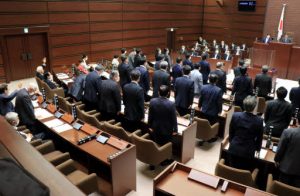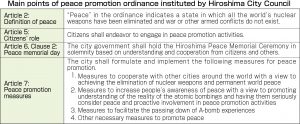Peace promotion ordinance passes Hiroshima City Council — “Peace Ceremony shall be performed in solemnity” phrase remains in new city law
Jun. 26, 2021
by Taiki Yomura and Hajime Niiyama, Staff Writers
The peace promotion ordinance proposal was passed by a majority of the Hiroshima City Council’s 54 members on June 25, during that body’s plenary session. The ordinance consists of a preamble and 10 articles and lays out the duties of the city government and roles of the city council and citizens in terms of peace promotion. The wording that the Peace Memorial Ceremony “shall be performed in solemnity” drew expressions of concern from civic groups and A-bomb survivor organizations due to the fear it could lead to constraints on free speech. Nevertheless, the phrase was kept in the ordinance, which will soon go into force.
The ordinance’s preamble, which outlines the city law’s principles, refers to the Treaty on the Prohibition of Nuclear Weapons (TPNW) having gone into effect in January of this year. Article 2 defines peace, describing it as “a state in which all the world’s nuclear weapons have been eliminated and war or other armed conflicts do not exist.” Article 5 sets aside the role of citizens to “endeavor to engage in activities related to the promotion of peace.”
Clause 2 of Article 6 indicates that the city government should hold the Hiroshima Peace Memorial Ceremony “in solemnity based on understanding and cooperation from citizens and others.” Two organizations that share the name the Hiroshima Prefectural Confederation of A-bomb Sufferers Organizations as well as the Hiroshima Bar Association, among others, demanded that the proposed draft be shelved or the article revised, arguing that “deliberations were not thorough enough” and that “the proposed draft can be interpreted as restricting people’s freedom of action.” Nevertheless, those opinions were not accepted.
The Hiroshima City Council’s policy-making review committee, which consists of representatives from all nine of the different political factions, began discussing the ordinance in July 2019. The committee drew up a draft after conducting deliberations and soliciting opinions from the public. The draft was submitted to the city council Chair Haruo Yamada on June 8. Mr. Yamada and Vice-Chair Kozo Watanabe proposed an amended draft at a secretaries-general meeting of the political factions on June 21. Members from eight factions, except the Communist Party, approved the amended draft, which was then proposed to the council session as a council-member bill.
About 80 percent of 52 councilors, or 42 members, excluding the chair and one absentee, voted in favor of the amended draft. Nine members opposed the draft resolution. They were five members of the Communist Party, two of the Civil Alliance for Peace and Constitutionalism, one of the Liberal Democratic Party’s Conservative Club, and one of the Civic Reform Network, the faction another member of which had walked out of the proceedings.
After the draft was passed, Hiroshima Mayor Kazumi Matsui said, “While there are concerns that memories of the atomic bombings are fading and that awareness of peace is on the decline, I find it significant that the ordinance clearly stipulates the mission the city should fulfill into the future.”
(Originally published on June 26, 2021)
The peace promotion ordinance proposal was passed by a majority of the Hiroshima City Council’s 54 members on June 25, during that body’s plenary session. The ordinance consists of a preamble and 10 articles and lays out the duties of the city government and roles of the city council and citizens in terms of peace promotion. The wording that the Peace Memorial Ceremony “shall be performed in solemnity” drew expressions of concern from civic groups and A-bomb survivor organizations due to the fear it could lead to constraints on free speech. Nevertheless, the phrase was kept in the ordinance, which will soon go into force.
The ordinance’s preamble, which outlines the city law’s principles, refers to the Treaty on the Prohibition of Nuclear Weapons (TPNW) having gone into effect in January of this year. Article 2 defines peace, describing it as “a state in which all the world’s nuclear weapons have been eliminated and war or other armed conflicts do not exist.” Article 5 sets aside the role of citizens to “endeavor to engage in activities related to the promotion of peace.”
Clause 2 of Article 6 indicates that the city government should hold the Hiroshima Peace Memorial Ceremony “in solemnity based on understanding and cooperation from citizens and others.” Two organizations that share the name the Hiroshima Prefectural Confederation of A-bomb Sufferers Organizations as well as the Hiroshima Bar Association, among others, demanded that the proposed draft be shelved or the article revised, arguing that “deliberations were not thorough enough” and that “the proposed draft can be interpreted as restricting people’s freedom of action.” Nevertheless, those opinions were not accepted.
The Hiroshima City Council’s policy-making review committee, which consists of representatives from all nine of the different political factions, began discussing the ordinance in July 2019. The committee drew up a draft after conducting deliberations and soliciting opinions from the public. The draft was submitted to the city council Chair Haruo Yamada on June 8. Mr. Yamada and Vice-Chair Kozo Watanabe proposed an amended draft at a secretaries-general meeting of the political factions on June 21. Members from eight factions, except the Communist Party, approved the amended draft, which was then proposed to the council session as a council-member bill.
About 80 percent of 52 councilors, or 42 members, excluding the chair and one absentee, voted in favor of the amended draft. Nine members opposed the draft resolution. They were five members of the Communist Party, two of the Civil Alliance for Peace and Constitutionalism, one of the Liberal Democratic Party’s Conservative Club, and one of the Civic Reform Network, the faction another member of which had walked out of the proceedings.
After the draft was passed, Hiroshima Mayor Kazumi Matsui said, “While there are concerns that memories of the atomic bombings are fading and that awareness of peace is on the decline, I find it significant that the ordinance clearly stipulates the mission the city should fulfill into the future.”
(Originally published on June 26, 2021)









